被动语态(不用被动语态的情形)[
- 格式:ppt
- 大小:694.50 KB
- 文档页数:18
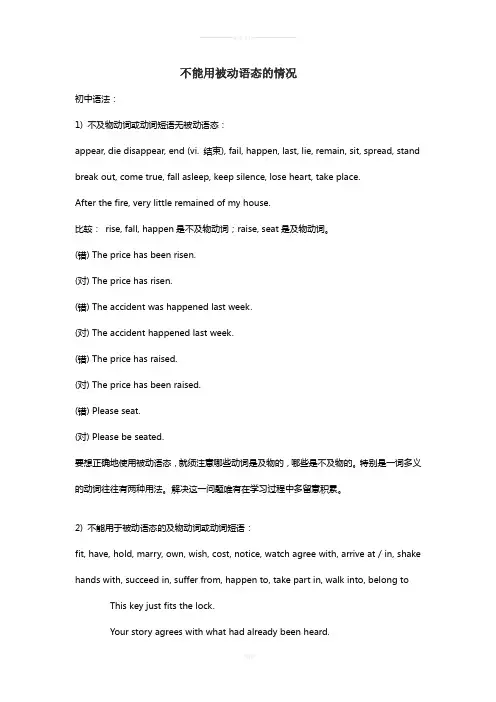
不能用被动语态的情况初中语法:1) 不及物动词或动词短语无被动语态:appear, die disappear, end (vi. 结束), fail, happen, last, lie, remain, sit, spread, stand break out, come true, fall asleep, keep silence, lose heart, take place.After the fire, very little remained of my house.比较:rise, fall, happen是不及物动词;raise, seat是及物动词。
(错) The price has been risen.(对) The price has risen.(错) The accident was happened last week.(对) The accident happened last week.(错) The price has raised.(对) The price has been raised.(错) Please seat.(对) Please be seated.要想正确地使用被动语态,就须注意哪些动词是及物的,哪些是不及物的。
特别是一词多义的动词往往有两种用法。
解决这一问题唯有在学习过程中多留意积累。
2) 不能用于被动语态的及物动词或动词短语:fit, have, hold, marry, own, wish, cost, notice, watch agree with, arrive at / in, shake hands with, succeed in, suffer from, happen to, take part in, walk into, belong to This key just fits the lock.Your story agrees with what had already been heard.3) 系动词无被动语态:appear, be become, fall, feel, get, grow, keep, look, remain, seem, smell, sound, stay, taste, turnIt sounds good.4) 带同源宾语的及物动词,反身代词,相互代词,不能用于被动语态:die, death, dream, live, lifeShe dreamed a bad dream last night.5) 当宾语是不定式时,很少用于被动语态。
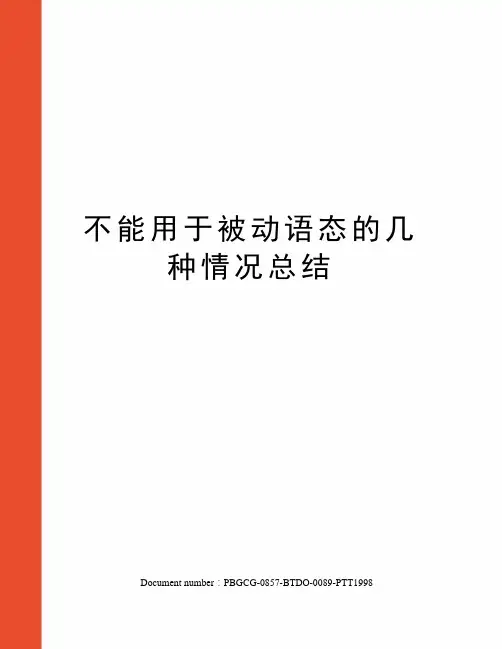
不能用于被动语态的几种情况总结Document number:PBGCG-0857-BTDO-0089-PTT1998不能用于被动语态的几种情况总结四川省阆中中学校任金石1、there be 结构及所有的不及物动词或动词短语充当谓语时,无被动语态。
:There are twelve moths in a year,Many of his songs have remained popular as ever,他的许多歌曲和以往一样仍然很流行。
Winning the medal is like a dream come true.获得奖牌好比梦想成真。
注:常见的不及物动词或动词短语有:appear, die, happen, lie(躺;位于), remain, occur, come true, break out, take place 等。
2、表示“状态”的谓语动词,如:last, hold, benefit, contain, equal, fit, join, mean, look like, consist of 等不能用被动语态。
:Each game lasts about an hour.每场比赛约一小时。
The committee consists of ten members.委员会由十人组成。
3、表示“归属”的动词,如have,own,belong to 等。
:We have three meals a day.我们一日吃三餐。
These islands belong to Spain.这些岛屿隶属西班牙。
4、表示“希望、意图”的动词,如wish,want,hope,like,love,hate等。
:But I hate autumn and winter。
但是我讨厌秋天和冬天。
5、宾语是反身代词或相互代词时谓语动词用主语语态,不能用被动语态。
:We should help each other.I found myself unable to speak.我发现自己说不出话了。
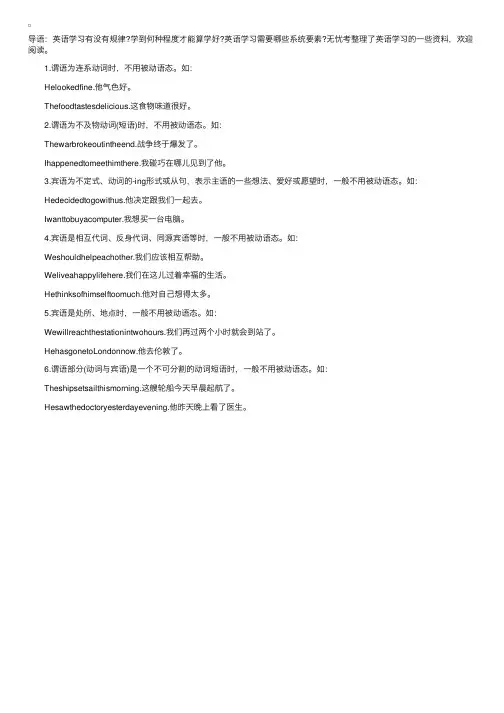
导语:英语学习有没有规律?学到何种程度才能算学好?英语学习需要哪些系统要素?⽆忧考整理了英语学习的⼀些资料,欢迎阅读。
1.谓语为连系动词时,不⽤被动语态。
如: Helookedfine.他⽓⾊好。
Thefoodtastesdelicious.这⾷物味道很好。
2.谓语为不及物动词(短语)时,不⽤被动语态。
如: Thewarbrokeoutintheend.战争终于爆发了。
Ihappenedtomeethimthere.我碰巧在哪⼉见到了他。
3.宾语为不定式、动词的-ing形式或从句,表⽰主语的⼀些想法、爱好或愿望时,⼀般不⽤被动语态。
如: Hedecidedtogowithus.他决定跟我们⼀起去。
Iwanttobuyacomputer.我想买⼀台电脑。
4.宾语是相互代词、反⾝代词、同源宾语等时,⼀般不⽤被动语态。
如: Weshouldhelpeachother.我们应该相互帮助。
Weliveahappylifehere.我们在这⼉过着幸福的⽣活。
Hethinksofhimselftoomuch.他对⾃⼰想得太多。
5.宾语是处所、地点时,⼀般不⽤被动语态。
如: Wewillreachthestationintwohours.我们再过两个⼩时就会到站了。
HehasgonetoLondonnow.他去伦敦了。
6.谓语部分(动词与宾语)是⼀个不可分割的动词短语时,⼀般不⽤被动语态。
如: Theshipsetsailthismorning.这艘轮船今天早晨起航了。
Hesawthedoctoryesterdayevening.他昨天晚上看了医⽣。
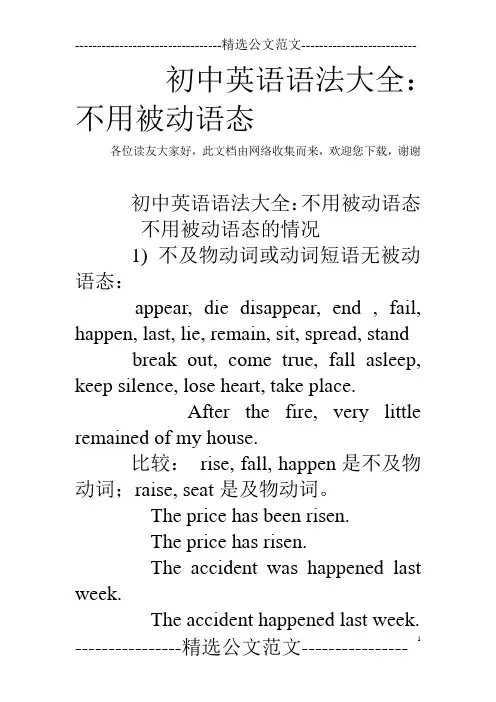
初中英语语法大全:不用被动语态各位读友大家好,此文档由网络收集而来,欢迎您下载,谢谢初中英语语法大全:不用被动语态不用被动语态的情况1) 不及物动词或动词短语无被动语态:appear, die disappear, end , fail, happen, last, lie, remain, sit, spread, stand break out, come true, fall asleep, keep silence, lose heart, take place.After the fire, very little remained of my house.比较:rise, fall, happen是不及物动词;raise, seat是及物动词。
The price has been risen.The price has risen.The accident was happened last week.The accident happened last week.The price has raised.The price has been raised.Please seat.Please be seated.要想正确地使用被动语态,就须注意哪些动词是及物的,哪些是不及物的。
特别是一词多义的动词往往有两种用法。
解决这一问题唯有在学习过程中多留意积累。
2) 不能用于被动语态的及物动词或动词短语:fit, have, hold, marry, own, wish, cost, notice, watch agree with, arrive at / in, shake hands with, succeed in, suffer from, happen to, take part in, walk into, belong toThis key just fits the lock.Your story agrees with what had already been heard.3) 系动词无被动语态:appear, be become, fall, feel, get,grow, keep, look, remain, seem, smell, sound, stay, taste, turnIt sounds good.4) 带同源宾语的及物动词,反身代词,相互代词,不能用于被动语态:die, death, dream, live, lifeShe dreamed a bad dream last night.5) 当宾语是不定式时,很少用于被动语态。
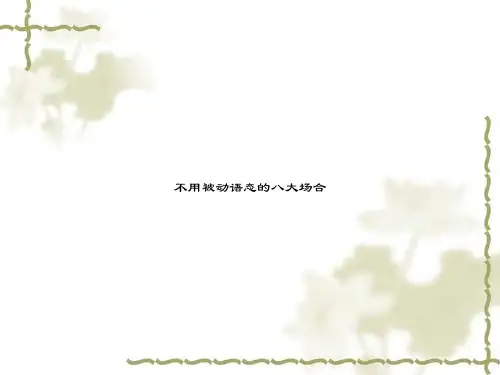
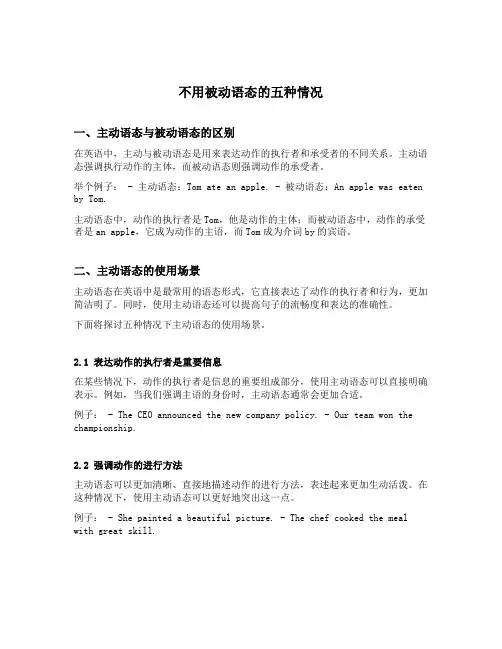
不用被动语态的五种情况一、主动语态与被动语态的区别在英语中,主动与被动语态是用来表达动作的执行者和承受者的不同关系。
主动语态强调执行动作的主体,而被动语态则强调动作的承受者。
举个例子: - 主动语态:Tom ate an apple. - 被动语态:An apple was eaten by Tom.主动语态中,动作的执行者是Tom,他是动作的主体;而被动语态中,动作的承受者是an apple,它成为动作的主语,而Tom成为介词by的宾语。
二、主动语态的使用场景主动语态在英语中是最常用的语态形式,它直接表达了动作的执行者和行为,更加简洁明了。
同时,使用主动语态还可以提高句子的流畅度和表达的准确性。
下面将探讨五种情况下主动语态的使用场景。
2.1 表达动作的执行者是重要信息在某些情况下,动作的执行者是信息的重要组成部分,使用主动语态可以直接明确表示。
例如,当我们强调主语的身份时,主动语态通常会更加合适。
例子: - The CEO announced the new company policy. - Our team won the championship.2.2 强调动作的进行方法主动语态可以更加清晰、直接地描述动作的进行方法,表述起来更加生动活泼。
在这种情况下,使用主动语态可以更好地突出这一点。
例子: - She painted a beautiful picture. - The chef cooked the meal with great skill.2.3 描述习惯性行为或普遍真理当我们需要表达习惯性行为或普遍真理时,主动语态是更为常见的选择。
被动语态在这种情况下显得多余且不必要。
例子: - People need food and water to survive. - Birds build nests to lay eggs.2.4 表述感受、兴趣和态度主动语态可以更好地表达人们的感受、兴趣和态度。
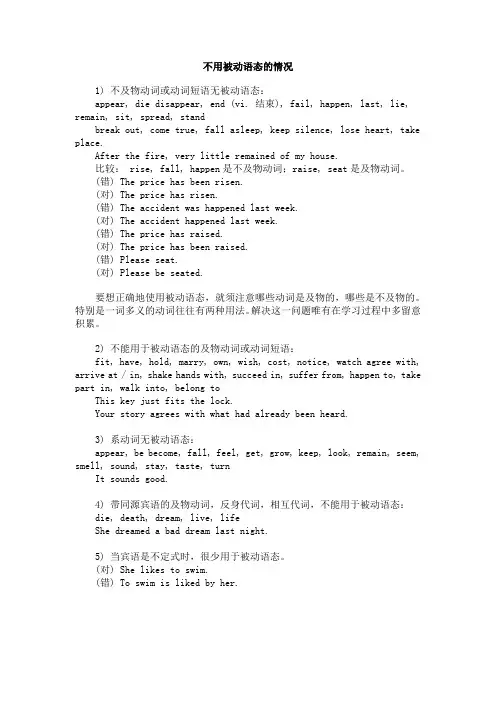
不用被动语态的情况1) 不及物动词或动词短语无被动语态:appear, die disappear, end (vi. 结束), fail, happen, last, lie, remain, sit, spread, standbreak out, come true, fall asleep, keep silence, lose heart, take place.After the fire, very little remained of my house.比较: rise, fall, happen是不及物动词;raise, seat是及物动词。
(错) The price has been risen.(对) The price has risen.(错) The accident was happened last week.(对) The accident happened last week.(错) The price has raised.(对) The price has been raised.(错) Please seat.(对) Please be seated.要想正确地使用被动语态,就须注意哪些动词是及物的,哪些是不及物的。
特别是一词多义的动词往往有两种用法。
解决这一问题唯有在学习过程中多留意积累。
2) 不能用于被动语态的及物动词或动词短语:fit, have, hold, marry, own, wish, cost, notice, watch agree with, arrive at / in, shake hands with, succeed in, suffer from, happen to, take part in, walk into, belong toThis key just fits the lock.Your story agrees with what had already been heard.3) 系动词无被动语态:appear, be become, fall, feel, get, grow, keep, look, remain, seem, smell, sound, stay, taste, turnIt sounds good.4) 带同源宾语的及物动词,反身代词,相互代词,不能用于被动语态:die, death, dream, live, lifeShe dreamed a bad dream last night.5) 当宾语是不定式时,很少用于被动语态。
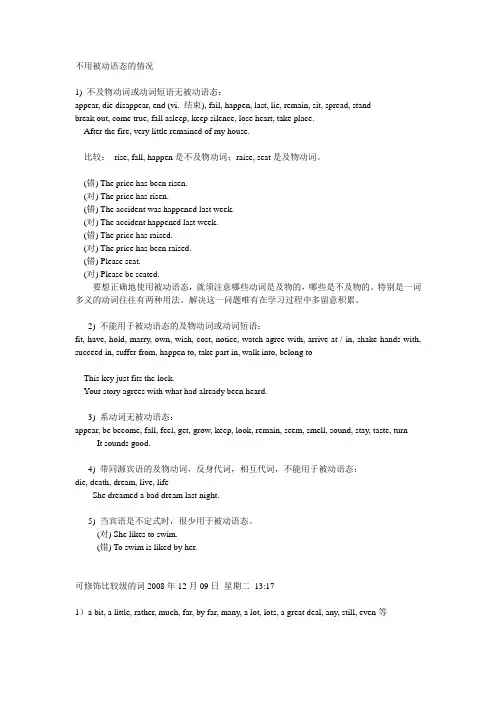
不用被动语态的情况1) 不及物动词或动词短语无被动语态:appear, die disappear, end (vi. 结束), fail, happen, last, lie, remain, sit, spread, standbreak out, come true, fall asleep, keep silence, lose heart, take place.After the fire, very little remained of my house.比较:rise, fall, happen是不及物动词;raise, seat是及物动词。
(错) The price has been risen.(对) The price has risen.(错) The accident was happened last week.(对) The accident happened last week.(错) The price has raised.(对) The price has been raised.(错) Please seat.(对) Please be seated.要想正确地使用被动语态,就须注意哪些动词是及物的,哪些是不及物的。
特别是一词多义的动词往往有两种用法。
解决这一问题唯有在学习过程中多留意积累。
2) 不能用于被动语态的及物动词或动词短语:fit, have, hold, marry, own, wish, cost, notice, watch agree with, arrive at / in, shake hands with, succeed in, suffer from, happen to, take part in, walk into, belong toThis key just fits the lock.Y our story agrees with what had already been heard.3) 系动词无被动语态:appear, be become, fall, feel, get, grow, keep, look, remain, seem, smell, sound, stay, taste, turn It sounds good.4) 带同源宾语的及物动词,反身代词,相互代词,不能用于被动语态:die, death, dream, live, lifeShe dreamed a bad dream last night.5) 当宾语是不定式时,很少用于被动语态。

英语不能用被动语态的情况不能用被动语态的情况初中语法:1)不及物动词或动词短语无被动语态:appear, die disappear, end (vi.结束),fail, happe n, last, lie, rema in, sit, spread, sta nd break out, come true, fall asleep, keep sile nee, lose heart, take place.After the fire, very little remained of my house.比较:rise, fall, happen是不及物动词;raise, seat是及物动词。
(错)The price has bee n rise n.(对)The price has rise n.(错)The accide nt was happe ned last week.(对)The accide nt happe ned last week.(错)The price has raised.(对)The price has bee n raised.(错)Please seat.(对)Please be seated.要想正确地使用被动语态,就须注意哪些动词是及物的,哪些是不及物的。
特别是一词多义的动词往往有两种用法。
解决这一问题唯有在学习过程中多留意积累。
2)不能用于被动语态的及物动词或动词短语:fit, have, hold, marry, own, wish, cost, notice, watch agree with, arrive at / in, shake hands with, succeed in, suffer from, happe n to, take part in, walk in to, bel ong toThis key just fits the lock.Your story agrees with what had already bee n heard.3)系动词无被动语态:appear, be become, fall, feel, get, grow, keep, look, rema in, seem, smell, sound, stay, taste, turn It sounds good.4)带同源宾语的及物动词,反身代词,相互代词,不能用于被动语态:die, death, dream, live, lifeShe dreamed a bad dream last ni ght.5)当宾语是不定式时,很少用于被动语态。
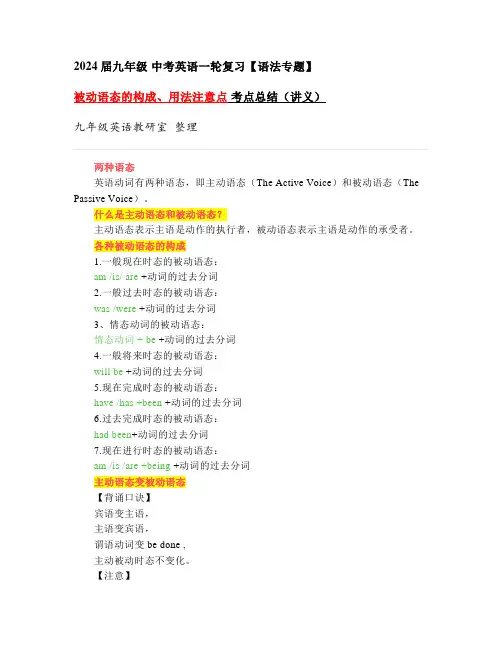
2024届九年级中考英语一轮复习【语法专题】被动语态的构成、用法注意点考点总结(讲义)九年级英语教研室整理两种语态英语动词有两种语态,即主动语态(The Active Voice)和被动语态(The Passive Voice)。
什么是主动语态和被动语态?主动语态表示主语是动作的执行者,被动语态表示主语是动作的承受者。
各种被动语态的构成1.一般现在时态的被动语态:am /is/ are +动词的过去分词2.一般过去时态的被动语态:was /were +动词的过去分词3、情态动词的被动语态:情态动词 + be +动词的过去分词4.一般将来时态的被动语态:will be +动词的过去分词5.现在完成时态的被动语态:have /has +been +动词的过去分词6.过去完成时态的被动语态:had been+动词的过去分词7.现在进行时态的被动语态:am /is /are +being +动词的过去分词主动语态变被动语态【背诵口诀】宾语变主语,主语变宾语,谓语动词变be done ,主动被动时态不变化。
【注意】❤️1.主动、被动的时态要一致。
❤️2.变成的被动语态的主语与谓语在单复数上保持一致。
同步训练:1.I broke the glass just now.2.Cats usually eat mice.3.Thousands of people plant many trees every year.4.Students have not cleaned the classroom yet.5.Eric shared his delicious cakes with his friends.6.Mo Yan will write a new book in three years.7.My father played cards on the Internet this morning.8.Workers have built two plastic factories so far .9.He gave me an EnglishEnglish dictionary.【两种】10.He speaks a liitle English and French.11.We saw the teacher enter the classroom happily.12.His jokes made the girl laugh.13.We should take care of the old men well.14.She has run out of her money.15.You must turn off the light before going to bed.参考答案1. The glass was broken just now by me.2. Mice are usually eaten by cats.3.Many trees are planted by thousands of people every year.4.The classroom has not been cleaned yet by students.5.His delicious cakes were shared with his friends by Eric.6.A new book will be written in three years by Mo Yan.7.Cards were played on the Internet by my father this morning.8.Two plastic factories have been built by workers so far.9.(1)I was given an EnglishEnglish dictionary by him.(2)An EnglishEnglish dictionary was given to me by him.10.A little English and French are spoken by him.11.The teacher was seen to enter the classroom happily by us.12.The girl was made to laugh by his jokes.13.The old men should be taken care of well by us.14.Her money has been run out of by her.15.The light must be turned off before going to bed by you.特殊情况被动语态(1)带双宾语的被动语态动词+ sb(间接宾语) +sth(直接宾语)背诵口诀:如遇双宾语,一般变间宾,若把直宾变,to /for 间宾连。
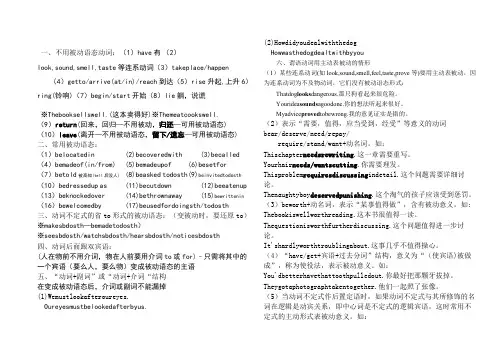
一、不用被动语态动词:(1)have有(2)look,sound,smell,taste等连系动词(3)takeplace/happen (4)getto/arrive(at/in)/reach到达(5)rise升起,上升6)ring(铃响)(7)begin/start开始(8)lie躺,说谎※Thebooksellswell.(这本卖得好)※Themeatcookswell.(9)return(回来,回归—不用被动,归还—可用被动语态) (10)leave(离开—不用被动语态,留下/遗忘—可用被动语态) 二、常用被动语态:(1)belocatedin (2)becoveredwith (3)becalled (4)bemadeof(in/from) (5)bemadeupof (6)besetfor(7)betold被高知(tell后没人)(8)beasked todosth(9)beinvitedtodosth (10)bedressedup as (11)becutdown (12)beeatenup (13)beknockedover (14)bethrownaway (15)bewrittenin (16)bewelcomedby (17)beusedfordoingsth/todosth三、动词不定式的省to形式的被动语态:(变被动时,要还原to)※makesbdosth—bemadetodosth)※seesbdosth/watchsbdosth/hearsbdosth/noticesbdosth四、动词后面跟双宾语:(人在物前不用介词,物在人前要用介词to或for)–只需将其中的一个宾语(要么人,要么物)变成被动语态的主语五、“动词+副词”或“动词+介词“结构在变成被动语态后,介词或副词不能漏掉(1)Wemustlookafteroureyes. Oureyesmustbelookedafterbyus.(2)HowdidyoudealwiththedogHowwasthedogdealtwithbyyou六、谓语动词用主动表被动的情形(1)某些连系动词(如look,sound,smell,feel,taste,prove等)要用主动表被动,因为连系动词为不及物动词,它们没有被动语态形式:Thatdog looks dangerous.那只狗看起来很危险。
不能用被动语态的几种情况被动语态是英语语法中常用的一种表达方式,它常用来强调动作的承受者而不是执行者。
然而,并非所有的情况都适合使用被动语态。
以下是一些不能使用被动语态的情况:1.无法确定执行者:在一些情况下,我们无法确定执行者是谁,这时就无法使用被动语态。
例如,如果我们不知道是谁做的一些动作,就无法对其进行被动化处理。
2. 动词没有被动形式:有些动词没有被动形式,这是因为它们的意义无法被转变为被动形式。
例如,感官动词(see,hear,smell,taste,feel)和心理状态动词(like,love,hate,want)通常不会用于被动语态。
3. 不确定的动作执行者:当多个人或对象可能共同执行一些动作时,也不能使用被动语态。
例如,"They built the house"(他们建造了房子)中的"they"表示了多个人共同完成了建造活动。
4. 不合理或不自然的表达:有时,使用被动语态会导致语句不自然或不合理。
在这种情况下,应该优先选择主动语态。
例如,"The cakewas baked by me"(蛋糕是我烤的)可以改为更自然的表达方式:"I baked the cake"(我烤了蛋糕)。
5. 句子的重点不在承受者:被动语态常用于强调动作承受者,但当句子的重点不在承受者时,就不应使用被动语态。
例如,"The tree was felled by the storm"(这棵树被暴风雨砍倒了)的重点是树被砍倒了,而不是暴风雨执行的动作。
6. 句子的主语是人:当句子的主语是人时,使用被动语态可能会导致句子不够直接和清晰。
在这种情况下,使用主动语态更为常见和直接,可以更清晰地表达意思。
例如,"I was born in Paris"(我出生在巴黎)中,使用被动语态会使句子不够直接,更常见的表达方式是:"My birthplace is Paris"(我的出生地是巴黎)。
被动语态语法知识点精讲:一、不用被动语态的情况(1) 不及物动词或动词短语无被动语态:appear, die disappear, end (vi. 结束), fail, happen, last, lie, remain, sit, spread, standbreak out, come true, fall asleep, keep silence, lose heart, take place.After the fire, very little remained of my house.比较:rise, fall, happen是不及物动词;raise, seat是及物动词。
(错) The price has been risen. (对) The price has risen.(错) The accident was happened last week.(对) The accident happened last week. (2) 不能用于被动语态的及物动词或动词短语:fit, have, hold, marry, own, wish, cost, notice, watch agree with, arrive at / in, shake hands with, succeed in, suffer from, happen to, take part in, walk into, belong toThis key just fits the lock.Your story agrees with what had already been heard.(3) 系动词无被动语态:appear, be become, fall, feel, get, grow, keep, look, remain, seem, smell, sound, stay, taste, turn It sounds good.(4) 带同源宾语的及物动词,反身代词,相互代词,不能用于被动语态:die, death, dream, live, lifeShe dreamed a bad dream last night.(5) 当宾语是不定式时,很少用于被动语态。
中考英语考点之 不用被动语态情况不能使用被动语态的情况被动语态的特殊情况:1. 不能用被动语态的几种情况:(1)所有的不及物动词或不及物动词词组不能用于被动语态。
(2)表示状态的谓语动词,如:last、hold、benefit、contain、equal、fit等。
(3)表示归属的动词,如have、own、belong to等。
(4)表示"希望、意图"的动词,如:wish、want、hope、like、love、hate等。
(5)宾语是反身代词或相互代词时谓语动词用主动语态,不能用被动语态。
2. 主动形式表被动意义的情况:(1)系动词没有被动形式,但有些表示感受、感官的连系动词feel,sound,taste,book,feel等在主系表结构中常以主动形式表示被动意义。
(2)当cut,sell,read,write,fill,cook,lock,wash,drive,keep等词带状语修饰语时。
(3)当break out、take place、shut off、turn off、work out等动词词组表示"发生、关闭、制定"等意思时。
(4)want,require,need后面的动名词用主动表示被动含义。
(5)be worth doing用主动形式表示被动含义。
(6)在"be + 形容词+ to do"中,不定式的逻辑宾语是句子的主语,用主动代被动。
另外:be to blame(受谴责),be to rent(出租)也用主动形式表被动。
学科&网1. As time went on, Einstein’s theory __________ to be correct.A. provedB. provesC. is provedD. was proved2. The retired worker likes getting up early. The air in the morning is good__________.A.to be breathedB. to breatheC. breathingD. being breathed3. I find the problems are easy __________.A. to be worked outB. to work them outC. to work outD. to be worked them out.4. Later Mrs Smith decided to buy that kind of cloth because she _________ that the cloth_________very well.A. has been told; washesB. had been told; washedC. was told; was washedD. had been told; was washed5. If so many raw materials_________ every day, they_________ in the future.A. run out; will be used upB. run out; will be run outC. are run out; will be using upD. are run out; will run out of6. His computer, which cost him a sum of money several weeks ago, is out of order and wants _________, though it looks very new.A.to repairB.to be repairingC. repairingD. repaired7. —How about watching a film on Sunday?—I can’t go to watch a film with a lot of homework _________.A. to be doneB. to doC. doingD. done1. (2018 • 江苏宿迁中考)This kind of pen __________, and is also very cheap. I think you can buy some.A. writes wellB. writes goodC. is written wellD. is written good2. (2016 • 江西)The water __________ dark and dirty. It’s no longer safe to drink.A. becameB. has becomeC. will becomeD. was becoming3. (2017 • 安徽)I am surprised at the new look of my hometown, for it __________ a lot over the years.A. changedB. changesC. will changeD. has changed4.(2017 • 山东泰安)With the development of science and technology, robot cooks __________in our families in the future.A. appearB. appearedC. will appearD. is appearing5. (2017 • 湖北省随州市中考)—What __________ if they __________ to the meeting late?—Sorry, I don’t know.A. will happen; goB. happened; goC. happens; will goD. will happen; will go6. (2017 • 江苏省宿迁市中考)My grandparents __________ for over 60 years and they loveeach other very much.A. have been marriedB. got marriedC. were marriedD. have got married7.(2016 • 湖南邵阳)We __________ for a picnic if it __________ rain this Sunday.A. will go; doesn’tB. will go; won’tC. go; doesn’t8. (2016 • 江苏镇江)—Have you been to Suning Plaza(苏宁购物中心) in our city?—No. Although it __________ for more than a week, I’m far too busy to go there.A. has startedB. has been onC. has been openD. has opened9. (2016 • 山东青岛)William Shakespeare __________ for 400 years, but his works still have greatinfluence today.A. diedB. was dyingC. has diedD. has been dead1. —What’s the meaning of the activity "Let’s Save"?—Paper shouldn’t ____________ in everyday life.A. wasteB. wastedC. be wastedD. is wasted2. The Dongying-Hainan airline ____________ for about 5 months. I have taken the flights three times.A. is openB. has openedC. has been openD. has been opened3. My house ____________ when you visited Beijing last time, so I didn’t invite you to my home.A. was being decoratedB. is being decoratedC. has been decoratedD. was decorated4. My e-mail ____________ to you last night. Have you received it ____________?A. sent;yetB. is sent;alreadyC. was sent;yet5. In the past few years, thousands of films ____________ all over the world.A. have producedB. have been producedC. are producingD. are being produced6. —It’s difficult for the village children to cross the river for school.—I think a bridge ____________ over the river.A. should be builtB. is being builtC. has been builtD. was built7. The World Expo(世博会)____________ in Shanghai now.A. being hadB. is havingC. is holdingD. is being held8. Now it’s much easier to shop online when your order is ready, the things you want to buy____________to you soon.A. sendB. were sentC. are sendingD. will be sent【跟踪训练】1. A【解析】句意:随着时间的推移,爱因斯坦的理论证明是正确的。
不用被动语态的情况1.不及物动词不能用于被动语态。
例如:The sun is rising. 太阳冉冉升起。
When did the thing occur? 那件事情是什么时候发生的?(错) The price has been risen.(对) The price has risen.(错) The accident was happened last week.(对) The accident happened last week.(错) The price has raised.(对) The price has been raised.(错) Please seat.(对) Please be seated.2.表示状态特征的系动词,如look, sound, feel, smell, taste, appear, seem, go, prove, turn, become, fall, get, grow, keep等的主动形式表示被动意义。
例如:It sounds very good. 听起来很好。
The food tastes so delicious. 那种食品美味可口。
3. read, write, wash, sell, wear, lock等动词和well, easily, smoothly等连用时,主动形式表示被动意义。
例如:The pen writes smoothly. 这笔用起来很流畅。
The coat washes easily. 这件大衣容易洗。
4.表示开始、结束、运动的动词不用于被动语态。
这类动词有begin, start, open, close, stop, end, shut, run, move等。
例如:Class begins at 8 o’clock.八点上课。
The shop closes at 7 o’clock.这家商店七点关门。
5.一部分动词用进行时表示被动意义。
不用或不能用被动语态的情况1. 不及物动词(vi.)没有承受着,所以是不可能用于被动语态的。
如:1)He went home.2)Mr. Li began to speak. The teachers and the students listened carefully.当然,不及物动词(vi.)后面跟上介词时相当于及物动词(vt.),就可以用于被动语态了。
如:Mr. Li began to speak. The teachers and the students listened to him carefully.→Mr. Li began to speak. He was listened to carefully by the teachers and thestudents.2. 有些表示状态的及物动词(vt.)(往往是不能用于进行时的vt.)如have、let、cost、hold(容纳,盛下)等,不表示动作,不可用于被动语态。
如:1)I have some new books. √→Some books are had by me. ×2)The bus holds fifty people. √这个汽车能坐50人。
→Fifty people were held by the bus. ×3. 当及物动词(vt.)所带的宾语是表示地点、处所(有时包括组织、团体)等时,一般不能改为被动语态。
如:1)He left Beijing. √→Beijing was left by him. ×2)He entered(走进)the classroom. √→The classroom was entered by him. ×3)He joined the English club last week. √→The English club was joined by him last week. ×说明:一般地说,判断一个主动句能否转换为被动句,主要看其宾语是否真的受到动作的影响,是否真的“被触及”了。